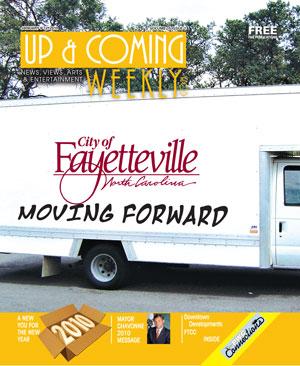 If you ask Mayor Tony Chavonne
what he thinks about the upcoming
year, you are going to get an earful.
Chavonne sees 2010 as the pivotal year
for the city in a lot of different ways. It
is his job, along with the members of
the Fayetteville City Council, to ensure
that everything is done to capitalize on
the city’s momentum going into 2010
and move the
city forward.
It’s a job
he takes
seriously.
If you ask Mayor Tony Chavonne
what he thinks about the upcoming
year, you are going to get an earful.
Chavonne sees 2010 as the pivotal year
for the city in a lot of different ways. It
is his job, along with the members of
the Fayetteville City Council, to ensure
that everything is done to capitalize on
the city’s momentum going into 2010
and move the
city forward.
It’s a job
he takes
seriously.
“This is a very critical year for us,” he said during a recent telephone interview. “This is the year where it all starts to happen. We are really going to see things coming out of the ground this year.”
Chavonne means that literally and fi guratively. The beginning of this year will see the groundbreaking of the N.C. Veterans Park in downtown. The $15 million project has been years in the making, with the most intensive working being done over the past few years. City residents will watch the corner of Bragg Boulevard and Hay Street transform into a park that rivals that found in cities around the nation. The project will incorporate water features and quiet walking paths alongside a modern visitor’s center. While bringing construction to the downtown, part of its beauty is its protection of green spaces within the city center.
On a less celebrated portion of the city, the Hope VI project will take off. The $20 million project, funded by a grant by the U.S. Housing and Urban Development was the seed money for the Old Wilmington Road Revitalization project. The entire project will be funded with approximately $100 million in public and private funds. The primary focus of the project is to provide high-quality housing that is accessible to a wide range of incomelevels. Included in the project is the demolition of Delona Gardens and Campbell Terrace, two public housing areas that will be replaced with modern housing that refl ects the architecture of Fayetteville. The distribution of low-income housing in the area will drop from 100 percent to 30 percent creating a more diverse and mixed-income neighborhood.
“This year is going to be the payoff for a lot of hard work over the past few years,” said Chavonne.
Besides physically seeing projects come out of the ground, the council is hoping to set a vision for the city for years to come.
“We have been pretty serious about the planning process,” said Chavonne. “Coming up in 2010, one of our priorities is going to be the passage of the Unifi ed Development Ordinance. We’ve been working on it for more than a year, and we hope it will set the standard for what Fayetteville will look like in the coming years.”
The UDO is a complete overhaul of the city’s zoning ordinances. It will spell out what can and can’t be done in certain areas of the city. Chavonne said the last overhaul of the ordinance occurred in the 1960s. The new ordinances will help address the visual blight that has been an ongoing problem for the city.
Chavonne said one of the city’s big problems is the lack of planning, which has residential neighborhoods inundated with businesses. “You can ride down the street and see it,” said Chavonne. “There are residential homes, and then there is a lawnmower repair shop. We are going to put standards into place that will clean that up.”
Chavonne said that other issues such as signage and the development of “cookie cutter” neighborhoods need attention as well.
“There’s a lot of middleground from where we are – almost unregulated to super regulated. We’ve worked very hard with stakeholders to try and fi nd that balance. The UDO is a big step in making our city a more attractive, clean, peaceful city,” he said.
One of the biggest topics the city will tackle this year is crime. “Our number one priority is going to be fi ghting crime. Statistics show that we are getting much better in some areas, but we will continue to work on it. We are still dealing with a lot of issues — like gangs — but we will address those issues,” he said.